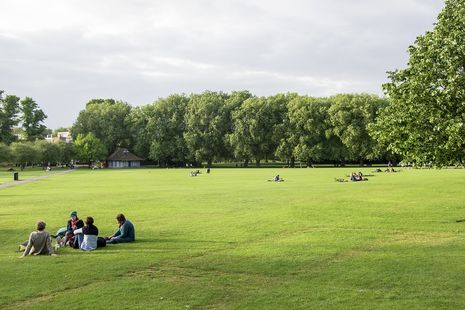Light News – Week 2: NHS fundraising, C-Sunday lost property & Medieval Cancer research
As we finish the first week of Easter term, Varsity is here with some lighter news from the past week

Medics running miles for the NHS
During May, Cambridge medical students are joining a UK-wide team of medical students taking part in a nationwide charity challenge called ‘EVERY MILE FOR OUR NHS’.
This challenge supports frontline NHS workers who have worked through the pandemic. The team is made up of over 100 students from 18 medical schools across the UK.
The team has chosen to raise funds for three charities: The Royal Medical Benevolent Fund, Cavell Nurses’ Trust and Doctors in Distress.
People from all over the country are getting involved in our campaign and challenging themselves in unique ways
- EveryMileForOurNHS (@everymileNHS) May 6, 2021
From running every day in May, to cycling 883 miles (one for each healthcare worker who has lost their life to covid) we’re pushing ourselves to go every mile pic.twitter.com/hABDTY5FNv
All students (both medical and non-medical) can get involved in the challenge by being active in ways such as running, walking, cycling, rowing, swimming and sharing their activities using the hashtag #everymileforourNHS.
The Cambridge Medical School is also marking their achievements online.
Students can sign up here at any point this month. Donations can be made on the Cambridge Team page.
C-Sunday lost property
After the events of C-Sunday (02/05), students noted a number of possessions left behind on Jesus Green. These included phones, driver’s licenses, AirPods, speakers and CamCards - many listed on Ticketbridge afterwards.
Although a lot of litter was left behind as students left Jesus Green, some students stayed behind to clean up afterwards, earning Kindbridges thanking them for their efforts.
One student took to Kindbridge to thank students who helped to clear up the litter left behind after the gatherings on Sunday.
New algorithm to help personalise cancer therapies
Cambridge researchers have developed a new algorithm that identifies tumours sensitive to particular immunotherapies. The MMRDetect clinical algorithm enables scientists to identify tumours that have “mismatch[ed] repair deficiencies” and then target treatment.
Researchers believe this algorithm could transform cancer treatments and save lives. The algorithm could be used as soon as the patient’s cancer is diagnosed.
The MMRDetect clinical algorithm developed by researchers at @Cambridge_Uni can flag tumors with mismatch repair (#MMR) deficiencies & then enhance personalized therapies to exploit those genetic weaknesses.
- Association for Computing Machinery (@TheOfficialACM) May 4, 2021
Read more here via University of Cambridge: https://t.co/DuYidVs7tT pic.twitter.com/BNq4givV6Q
The researchers used data from thousands of NHS cancer patient samples sequenced through the 100,000 Genomes Project, a national genome sequencing endeavour. The study identified nine DNA repair genes that guard the human genome, and suggests that signatures of repair pathway effects could be essential biomarkers in precision medicine.
The study was led by researchers from the Department of Medical Genetics and MRC Cancer Unit, and was funded by Cancer Research UK (CRUK), Wellcome, Medical Research Council, Dr Josef Steiner Foundation and was supported by the Cambridge NIHR Biomedical Research Campus. It was published in the journal Nature Cancer (28/04).
Cancer rates in medieval Britain ten times higher than previously estimated
A study led by a team at the University was the first to use x-rays and CT scans to detect evidence of cancer. It has found that 9-14% of adults in medieval Britain had cancer when they died.
The team studied the remains of 143 skeletons of the pre-industrial population dating from the 6th to the 16th century, with sites include a former charitable hospital, now part of St John’s College. The results of the study are published in the journal Cancer.
This suggests that cancer was around 10 times more dominant than previously thought, even before exposure to industrial tumour-inducing chemicals and tobacco.
“Until now it was thought that the most significant causes of ill health in medieval people were infectious diseases such as dysentery and bubonic plague, along with malnutrition and injuries due to accidents or warfare,” co-author of the study Dr Jenna Dittmar said.
.@UCamArchaeology researchers found that in medieval Britain, cancer was likely present in 9-14% of adults by the time of death. This is considerably lower than the 40-50% figure for modern populations & highlights the increase in cancer prevalence. https://t.co/AXhNP9Tfca pic.twitter.com/G6xINhMCbA
- ACS Journal Cancer (@JournalCancer) May 5, 2021
“Until now it was thought that the most significant causes of ill health in medieval people were infectious diseases such as dysentery and bubonic plague, along with malnutrition and injuries due to accidents or warfare.”
 Features / Should I stay or should I go? Cambridge students and alumni reflect on how their memories stay with them15 December 2025
Features / Should I stay or should I go? Cambridge students and alumni reflect on how their memories stay with them15 December 2025 News / Cambridge study finds students learn better with notes than AI13 December 2025
News / Cambridge study finds students learn better with notes than AI13 December 2025 News / Dons warn PM about Vet School closure16 December 2025
News / Dons warn PM about Vet School closure16 December 2025 News / News In Brief: Michaelmas marriages, monogamous mammals, and messaging manipulation15 December 2025
News / News In Brief: Michaelmas marriages, monogamous mammals, and messaging manipulation15 December 2025 Comment / The magic of an eight-week term15 December 2025
Comment / The magic of an eight-week term15 December 2025









